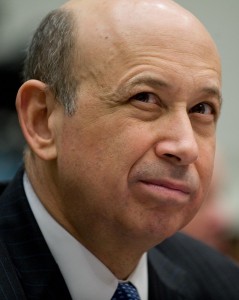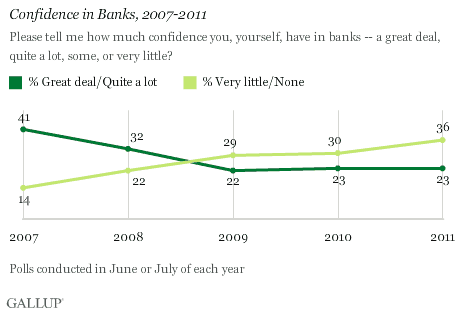
Take a look around. Everyone’s angry. The 99% are upset that they haven’t been getting their fair share. The 1% is angry at the suggestion that its own share has been much too large for far too long. And Washington is engaged in a heated tug of war about how much regulation of the line of demarcation separating Wall Street from Main Street is too much.
While the Republican presidential field is content to point fingers at the White House, arguing that the 99% should be leveling their accusations of corruption and mismanagement not at Wall Street and the financial services industry but at the president, data suggests the American people are still hungry for their pound of flesh from banks and the larger financial services sector.
Indeed, according to a June Gallup poll, “thirty-six percent of Americans have ‘very little’ or ‘no’ confidence in U.S. banks—up from 30% last year and the highest on record.”
If anything, such robust cynicism on the part of average Americans suggests the moment is more ripe now than ever for both sides of the aisle to shelve their pro- vs. anti-Wall Street talking points and come to at least one inarguable consensus: in light of the catastrophe that was the 2007-2008 financial crisis, some form of regulation is necessary.
Yet since Dodd-Frank’s Volcker Rule was released by regulators for comment last month, some of the biggest players on Wall Street—including investment bank Goldman Sachs—appear more defiant than ever, amassing their sizable stockpiles of capital to lobby Washington to take the teeth out of the regulation, which is intended to reduce the systemically risky practice of proprietary trading on the part of banks.
Despite the gargantuan lobbying efforts of Wall Street, though, the hunger for a legitimate and transparent system of checks and balances on the rogue excesses of the few—not all—bad actors in the financial services industry is implacable. No matter how much wailing or gnashing of teeth Wall Street exhibits, “something’s gotta give” if we’re to successfully reinstill confidence in Wall Street in the minds of those on Main Street.
As several of the Occupy Wall Street protesters professed in a Tuesday op-ed in the wake of the New York City Police Department’s eviction of the 99% from lower Manhattan’s Zuccotti Park in the wee hours of the morning on Tuesday, “you can’t evict an idea whose time has come.”
While many on Wall Street may have breathed a sigh of relief as they sauntered through a Zuccotti Park this morning free of protesters for the first time in months, any sense of respite or vindication they may have felt could ultimately prove short-lived if the issues and concerns raised by the occupiers—however cacophonous and diffuse they were at times—aren’t taken seriously and Wall Street’s overindulgences aren’t sufficiently addressed with all deliberate speed.
Indeed, as financial regulator turned University of Missouri-Kansas City professor William K. Black notes in drawing parallels between the largely unregulated financial services industry today and the “looting” that followed the deregulation of the savings and loans industry in the 80s and 90s, “The costs of regulation are trivial relative to the costs of [another financial crisis.]”
